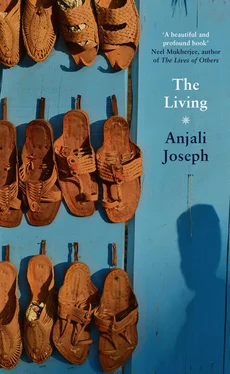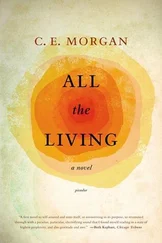1 ...6 7 8 10 11 12 ...30 This morning again I had the dream. This time it was in the courtyard of the old Rajwada. People came and went, passing and crossing one another, and I was at the side, where the bartan sellers sit with their new, well-made pans, or the old woman inside the gate, with her basket of flowers. I woke not remembering who I was, or where, still looking for all those feet.
The metal at the top of the bed was cold. The room was damp and dark. I thought of a shower over a green vegetable field, with a small temple at the end. I saw myself bending to pray at the lintel, hardly seeing the surrounding fields as rain smudged them out. But I wasn’t in a field of cucumber vines; I was here in the city. At the other end of the room the cat was watching me. I cursed silently, and got up.
*
This afternoon I was hammering the soles I’d cut in the morning. She sat next to me, using scraps of hide to cut out decorations: sharp-petalled flowers that she stamped with a die. I listened to the silence, the road outside, and from the back the birds. The rain smelled fresh, but inside the damp mixed with the smell of the hides. When it was time for tea, before she went to the kitchen she put on the radio.
This is the Voice of Heaven. And now on the Voice of Heaven you’ll hear the news in Marathi. The Prime Minister has said …
The cat rose from the corner. He yawned, stretched out his forearms, then his legs, one foot at a time in the air. He sat on his haunches, glaring at me, sleepy and bad-tempered as though he’d only just remembered his condition in life. Then he wandered out. Rascal, badmash, shaitan, I said, and as he passed he leaned on me, heavy and friendly like a drunk.
Eh, Tukoba! my wife called from the kitchen. Then, because he didn’t stop, Tukaram Maharaj!
Someone could take offence, I suppose, but no one has. Perhaps it’s age. The old, like the drunk, are judged differently. I don’t really believe cats have names, but she, this one, insisted we name him, and so on a whim I said Tuka. I don’t know much about poets, or saints, or cats for that matter. During my drinking years, when he was young, this cat was good at getting out of the way, so we never lost respect for each other.
She handed me my tea. You and that cat, she said.
I stood at the door, looking at him looking out. He sat blinking and washing his face until something moved — a bird, a flash of colour. Then he went with purpose into the yard.
I left for my walk. It’s not that I’ve given up drinking, I say to myself in the evenings. I’m just not drinking right now. How long has it been? Nine years? Ten? The sun was gone, the light was becoming blue. It’s one of my two favourite times of day, a sadness as the electric lights come on and the air holds the smell of dhoop and woodsmoke. The leaves of the trees blacken, and birds fly up, calling to each other.
Pawar! Arun! I thought I heard as I passed the bottle shop.
I kept walking, but I put out a hand to wave. Borkar.
When I returned home, I heard the radio, Bhimsen Joshi’s familiar voice blaring out, a voice I’ve never specially cared for. I could see the light through the door, which was a little ajar.
Is it time to go? These days I’m sure I need to, and I get up in the night, and go out to the latrine. But I have difficulty beginning.
There’s a sense of urgency, but it’ll start, then stop. During these excursions, still dreaming I suppose, I believe I am at home, I mean the house where I grew up. A boy, stumbling into moonlight. In the room where I slept as a child, the walls smelled of ash and cow dung, smoky and rich. If you haven’t been in a room plastered with gobar I can’t explain. It’s sweet, but catches in the back of your throat. Now, in the rains, the smell alters, a growing thing.
My brother and I slept in the corner. His knee in my leg, my foot on his calf, his snoring. The light from the window and shadows moved near us. Sometimes we had to listen to our parents’ soft noises. In the morning he stirred earlier, unclouded. I had to be shaken awake, confused, often angry.
My younger daughter-in-law tells her son, Rohan, to love his brother, to look after him. We were never told such things. When we fought, if it wasn’t out of sight, we were beaten for giving trouble. When we hated each other, which was often, we still slept entangled, resenting it, my knee in his back, his bony elbow in my ribs. There was no sentiment between us, but we would have died for each other.
I remember the offcuts we were given to play with. Small, oddly formed pieces. We learned to plait the leather, or stamp out a flower.
This morning I was polishing the ends of the chappals, varnishing them, checking them. Everything should be perfect. Why so much care for something a man will put between his feet and the ground? But the chappals will be his constant companions. He’ll spend more time with them than with his wife. One side of the sole may wear out more, depending on how he walks, so that you could pick up his chappals and observe that he leans a little into his centre, or a little out towards the world. Some people walk quite evenly, but not many, I’ve noticed, not many. Most of us shuffle along in our own strange way, not giving it attention.
The thing I make is with a man when he’s alone, unnoticed. He can rely on it. Our chappals aren’t like the cheap manufactured ones, stuck with glue; ours will be with you for a long time.
I’ve never made a perfect pair. There’s always something — the scorpion’s tail on top of the belt curves differently on one side, or there’s an asymmetry in the point of the toe.
I could say it doesn’t matter, no one will notice. That the only perfect thing is a dead thing, that each pair is like a husband and wife: their imperfections complement each other.
At first it’s uncomfortable to wear our chappals. They have to be lived with. When they are new, they harass the skin between your big and middle toes. You will dip them in water and let them dry in the sun. The varnish will come off the sole. You’ll wear them in, slipping around. Like a tool used by the same man for years, or a child raised by a certain woman, they’ll bear the imprint of your habitual bias.
My eldest son, who makes the manufactured chappals, has heard all this and isn’t interested. They came this Sunday, without Anil, who had a cricket match. My daughter-in-law brought til laddoos for us to take to Pune.
Can you even remember how to make a proper chappal? I asked Prakash. I don’t know why I feel the need to have these conversations with him.
He nodded, and waved one hand. His face is smooth, this son of mine, and his eyes slide around. He’s darker than I, looks more like my brother.
Do you remember how? I persisted.
He smiled, but he looked irritated.
What will you teach your son? I asked.
His eyes slid up to mine, then he looked away. He exhaled. Was that last night’s alcohol? His teeth are red: too much gutka.
My wife came with tea and bhajias. She put her small hand on his shoulder. He looked up and smiled, and his face changed and became absorbed, open.
If Prakash had been better in school he would have been like his younger brother, I thought, as I poured hot tea down my throat. I watched him eat, his fingers shiny with oil. He’s strong, taller than I. He likes his work in the workshop with the men, and drink, and listening to songs on the radio. I don’t know what else he gets up to. His wife is a practical woman, she wouldn’t complain. And Anil, he’s not like my other grandsons, in the city, but he’s a good boy, straightforward. When his cousins come here he shows them things: the pond to swim in, or they go to the fort by bus. They look up to him, but they also turn their heads to each other and smile. His mother is always with him. They are different; they live alone, in a way. A bus takes them to school. They have a uniform, a routine.
Читать дальше
Конец ознакомительного отрывка
Купить книгу











